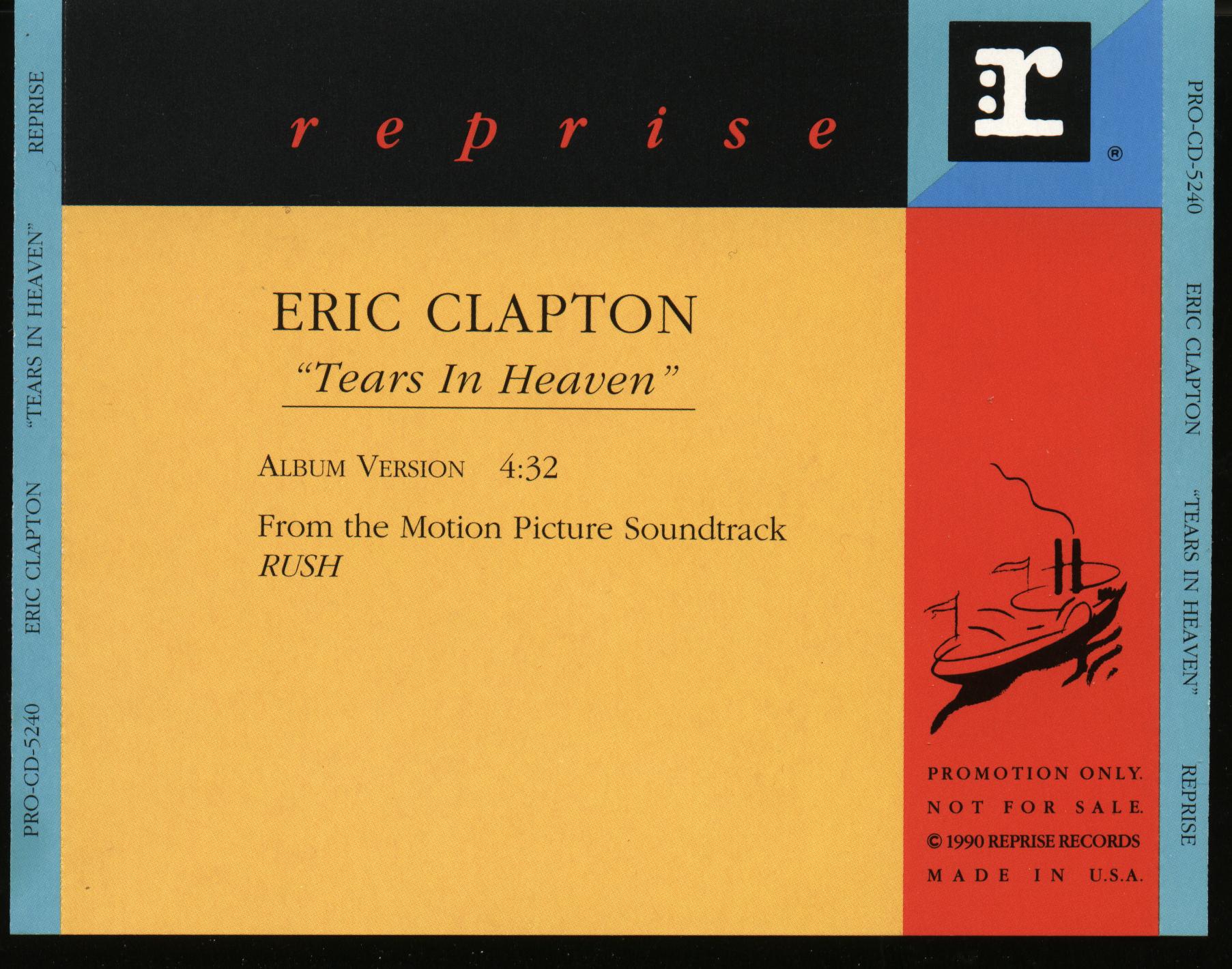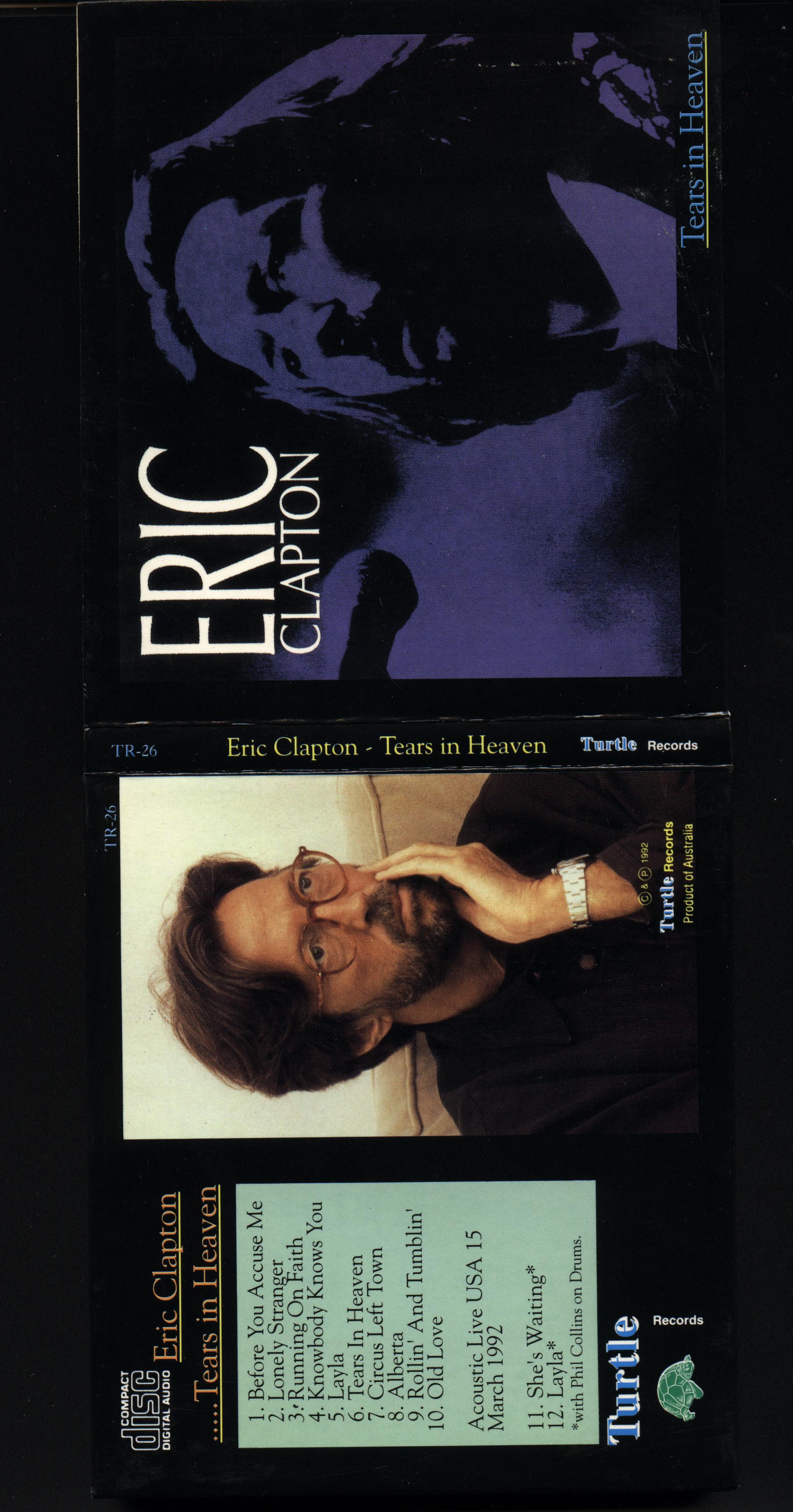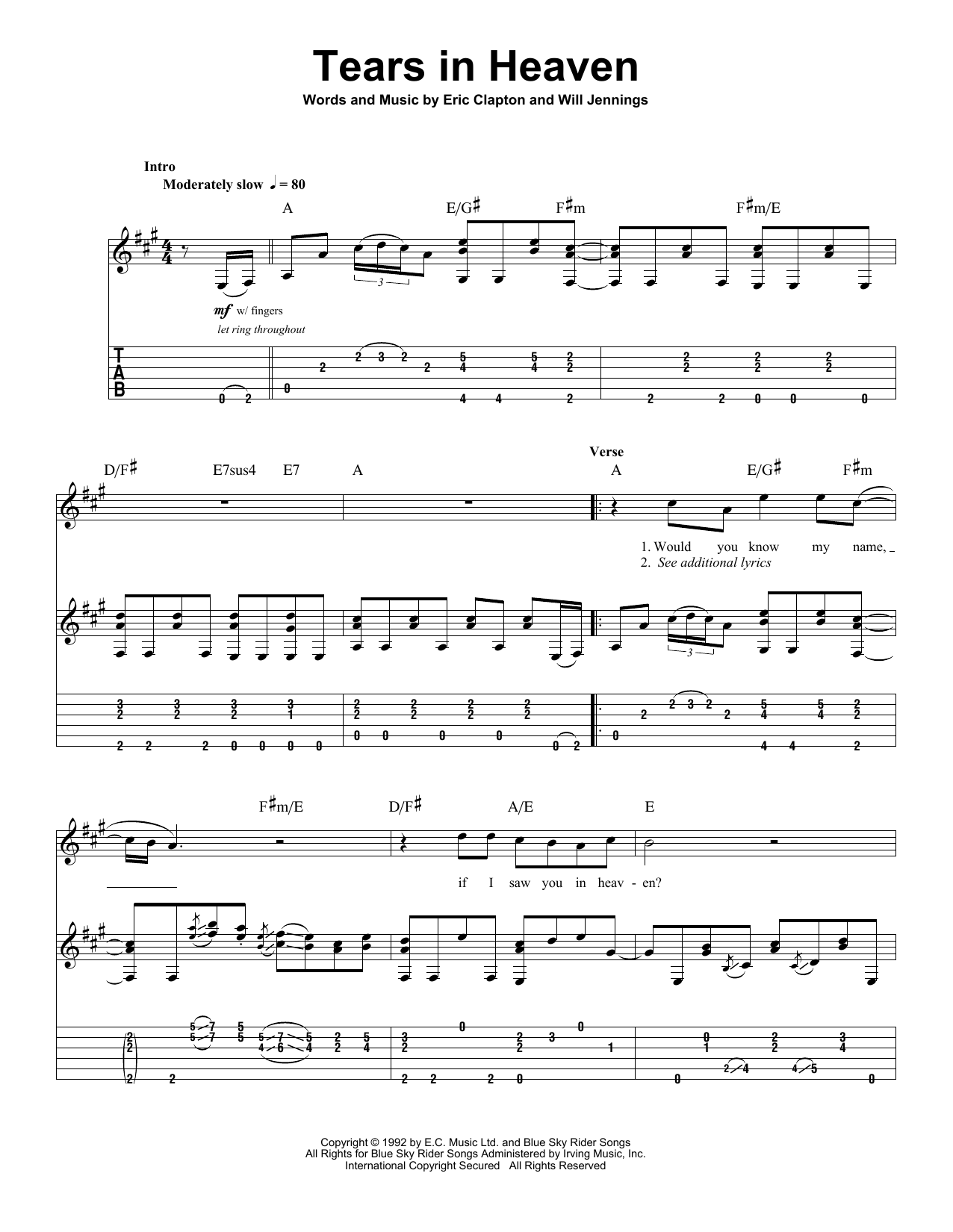Eric Clapton Tears In Heaven: A Journey Through Pain, Redemption, And Musical Genius
There’s something about Eric Clapton’s “Tears in Heaven” that touches the soul in ways words often can’t. It’s not just a song; it’s an emotional journey, a raw expression of grief, and a testament to the power of music to heal. From the first strum of the guitar to the haunting lyrics, this masterpiece has resonated with millions around the world. But what makes “Tears in Heaven” so special? Let’s dive into its story, the man behind it, and why it continues to move hearts decades after its release.
Picture this: a legendary guitarist, a tragic loss, and a melody that speaks to the depths of human emotion. That’s exactly what “Tears in Heaven” is all about. Eric Clapton didn’t just write a song here—he poured his heart out, creating something that transcends time and culture. It’s a reminder that even the most celebrated musicians are human, capable of feeling pain just like the rest of us.
This isn’t just a story about a hit single or a chart-topping moment. It’s about resilience, love, and finding meaning in the face of unimaginable tragedy. So buckle up, because we’re about to take a deep dive into Eric Clapton’s world, exploring the origins of “Tears in Heaven,” its impact, and why it still matters today.
- Madi Ruve Unveiling The Underwater Photographer More Explore Now
- Lee Jehoon The Rising Star Of Korean Cinema All You Need To Know
Table of Contents
- Eric Clapton: A Brief Biography
- The Origins of "Tears in Heaven"
- Understanding the Lyrics
- Musical Elements That Make It Iconic
- The Personal Impact on Clapton
- Public Reception and Legacy
- Awards and Honors
- Why "Tears in Heaven" Still Resonates Today
- Influence on Modern Music
- Final Thoughts
Eric Clapton: A Brief Biography
Before we delve into the specifics of “Tears in Heaven,” let’s get to know the man behind the music. Eric Patrick Clapton was born on March 30, 1945, in Ripley, Surrey, England. He grew up in a humble family, raised by his grandparents after his mother left him at a young age. This early life shaped his outlook and fueled his passion for music. By the time he was in his teens, Clapton had already picked up the guitar, inspired by blues legends like Robert Johnson and B.B. King.
Clapton’s career skyrocketed in the 1960s when he joined bands like The Yardbirds and Cream, earning him the nickname “Slowhand.” But it wasn’t just his technical prowess that set him apart—it was his ability to convey emotion through his playing. As one of the most celebrated guitarists of all time, Clapton’s journey hasn’t been without its challenges, including struggles with addiction and personal loss.
Key Facts About Eric Clapton
| Full Name | Eric Patrick Clapton |
|---|---|
| Birthdate | March 30, 1945 |
| Place of Birth | Ripley, Surrey, England |
| Occupation | Musician, Singer, Songwriter |
| Notable Bands | The Yardbirds, Cream, Derek and the Dominos |
The Origins of "Tears in Heaven"
Now, let’s talk about the elephant in the room—or rather, the tragedy that inspired one of Clapton’s most iconic songs. In 1991, Eric Clapton’s four-year-old son, Conor, tragically fell from a high-rise apartment in New York City. The loss devastated Clapton, who channeled his grief into writing “Tears in Heaven” for the soundtrack of the movie *Rush*. It wasn’t just a commercial decision; it was therapy. Writing the song helped him process his emotions and honor Conor’s memory.
“Tears in Heaven” isn’t just about death—it’s about longing, acceptance, and hope. The lyrics explore the idea of reuniting with loved ones in the afterlife, questioning whether they can see us from above. It’s a universal theme that resonates with anyone who’s ever experienced loss.
Key Events Leading to the Song
- 1991: Tragic death of Conor Clapton
- 1992: Release of “Tears in Heaven” as part of the *Rush* soundtrack
- 1993: Song wins multiple Grammy Awards
Understanding the Lyrics
The beauty of “Tears in Heaven” lies in its simplicity and sincerity. The lyrics are stripped down, focusing on raw emotion rather than complex metaphors. Lines like “Would you know my name if I saw you in heaven?” and “Must I cry again?” tug at the heartstrings, creating a sense of intimacy between the listener and the artist.
But what do these lyrics really mean? On the surface, they seem straightforward, but there’s depth to every word. Clapton isn’t just asking rhetorical questions—he’s grappling with the unknown, seeking answers to questions no one can truly answer. This vulnerability is what makes the song so relatable.
Key Themes in the Lyrics
- Grief and Loss
- Hope and Redemption
- Connection Beyond Death
Musical Elements That Make It Iconic
When you listen to “Tears in Heaven,” the first thing you notice is the gentle acoustic guitar that opens the track. Clapton’s playing is understated yet powerful, setting the tone for the rest of the song. The arrangement is minimalistic, allowing the lyrics and melody to shine. There’s no need for flashy solos or elaborate production—just a man and his guitar, telling a story.
Another standout element is the vocal delivery. Clapton sings with restraint, letting the emotion come through naturally. It’s a far cry from the fiery blues performances he’s known for, but that’s what makes it so effective. The song’s structure is also noteworthy, with a simple verse-chorus pattern that builds gradually, culminating in a powerful emotional release.
Instrumentation Highlights
- Acoustic Guitar: Provides the backbone of the song
- Strings: Add a cinematic quality to the arrangement
- Vocals: Delivered with heartfelt sincerity
The Personal Impact on Clapton
Creating “Tears in Heaven” wasn’t easy for Eric Clapton. Writing about such a personal tragedy required courage and vulnerability. But in many ways, the song became a lifeline for him during one of the darkest periods of his life. It allowed him to express his pain in a way that words alone couldn’t.
Interestingly, Clapton has said in interviews that performing the song live is both cathartic and challenging. It brings back memories of Conor, but it also serves as a reminder of the healing power of music. For Clapton, “Tears in Heaven” isn’t just a hit—it’s a symbol of survival.
Public Reception and Legacy
When “Tears in Heaven” was released, it quickly became a global phenomenon. Critics praised its emotional depth, while fans embraced it as an anthem for those dealing with loss. The song reached number two on the Billboard Hot 100 chart and topped the Adult Contemporary chart, proving its universal appeal.
But beyond the numbers, “Tears in Heaven” left a lasting legacy. It’s been covered by countless artists, featured in films and TV shows, and continues to be played at memorials and funerals worldwide. Its impact extends far beyond the music industry, touching lives in ways Clapton probably never imagined.
Notable Moments in the Song’s History
- 1993 Grammy Awards: Won Song of the Year and Record of the Year
- 2000: Inducted into the Grammy Hall of Fame
- 2020: Featured in the documentary *Eric Clapton: Life in 12 Bars*
Awards and Honors
“Tears in Heaven” has garnered numerous accolades over the years, cementing its place in music history. At the 1993 Grammy Awards, it won three major categories: Song of the Year, Record of the Year, and Best Pop Vocal Performance. It also received a Brit Award for Best British Single, further solidifying its status as a cultural touchstone.
Beyond awards, the song has been recognized for its contribution to music and society. Its inclusion in the Grammy Hall of Fame is a testament to its enduring relevance. And while Clapton may have written it for personal reasons, its impact on the world is undeniable.
Why "Tears in Heaven" Still Resonates Today
In a world where music trends come and go, “Tears in Heaven” remains timeless. Its themes of love, loss, and hope are as relevant today as they were when the song was released. In fact, the pandemic and subsequent global upheaval have made its message even more poignant. People continue to find solace in its lyrics, using it as a soundtrack for their own journeys of healing.
What sets “Tears in Heaven” apart is its authenticity. Unlike many songs that try too hard to be profound, this one speaks from the heart. Its honesty is what keeps it alive in the hearts of listeners across generations.
Influence on Modern Music
Eric Clapton’s influence on modern music cannot be overstated. “Tears in Heaven” paved the way for other artists to explore vulnerable, introspective themes in their work. Its success proved that there’s a market for music that prioritizes emotion over spectacle. Today, you can hear echoes of Clapton’s style in the works of artists like Ed Sheeran, John Mayer, and even newer acts like Jacob Collier.
But influence isn’t just about copying—it’s about inspiration. Many musicians cite “Tears in Heaven” as a turning point in their understanding of songwriting. Its ability to connect with listeners on such a deep level has inspired countless others to pursue similar paths.
Final Thoughts
“Tears in Heaven” is more than just a song—it’s a testament to the power of music to heal, inspire, and connect. Eric Clapton’s ability to transform personal tragedy into a universal masterpiece is a rare gift, one that continues to resonate with millions around the world. As we reflect on its legacy, it’s clear that this song will remain a cornerstone of music history for years to come.
So the next time you hear “Tears in Heaven,” take a moment to appreciate its depth and meaning. And if you feel moved, don’t hesitate to share your thoughts or leave a comment below. After all, part of the beauty of music is the conversation it sparks. Thanks for joining me on this journey, and keep the spirit of “Tears in Heaven” alive in your heart.



Detail Author:
- Name : Ms. Casandra Volkman
- Username : jcole
- Email : nturcotte@auer.com
- Birthdate : 1970-12-02
- Address : 40809 Ellsworth Glen Suite 631 Barrymouth, DC 38161
- Phone : (657) 372-5546
- Company : Von, Tillman and Senger
- Job : Precision Dyer
- Bio : Ut quidem nihil corporis et similique et error. Dignissimos similique tempora commodi adipisci omnis sit ut. Nostrum suscipit qui ipsum esse. Temporibus ad commodi neque dolor est rerum voluptas.
Socials
facebook:
- url : https://facebook.com/camren.cormier
- username : camren.cormier
- bio : Commodi est sed officiis qui cum. Vel maiores eius officia eos dicta.
- followers : 719
- following : 2978
twitter:
- url : https://twitter.com/ccormier
- username : ccormier
- bio : Minima ut et a dolorem quae aperiam. Nesciunt voluptates fugiat molestias soluta fugiat.
- followers : 3330
- following : 2297